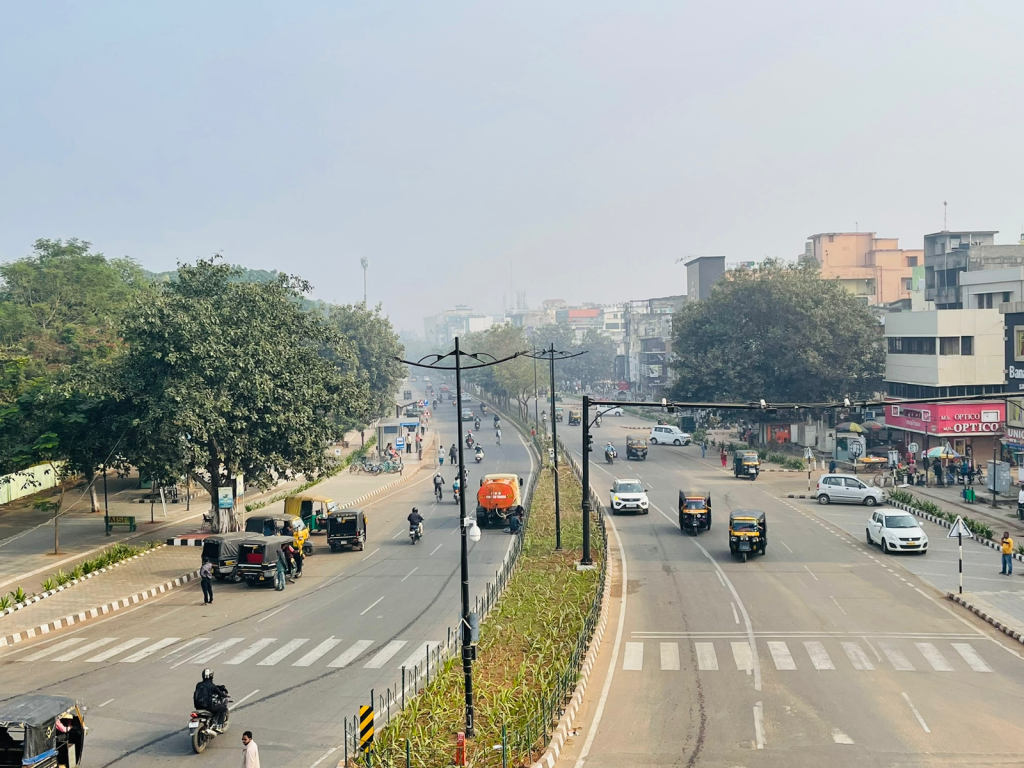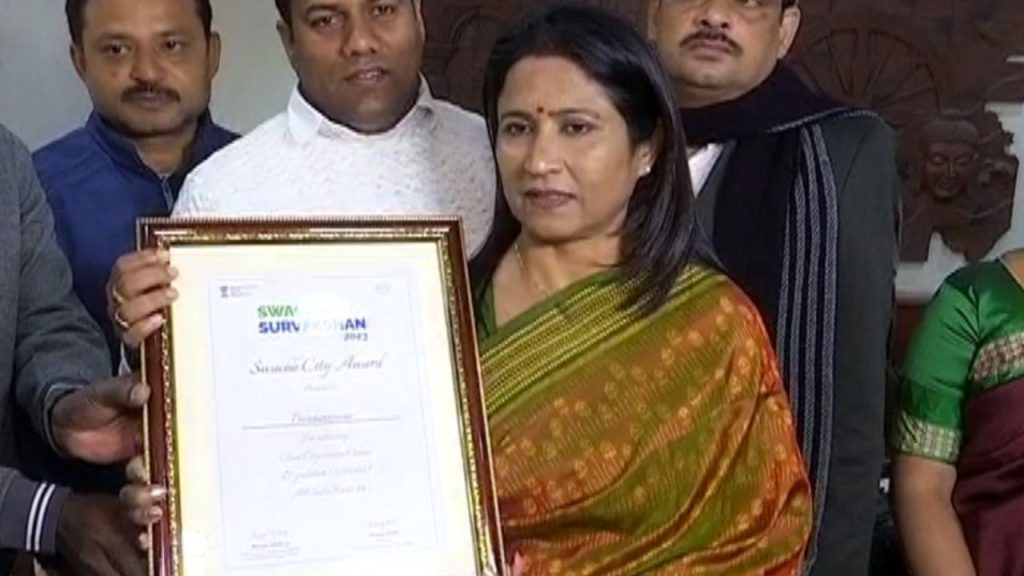In the latest Swachh Survekshan 2024, Bhubaneswar has surged to an impressive 9th position among the cleanest big cities in India. This remarkable achievement not only highlights the city’s ongoing commitment to cleanliness but also demonstrates its successful efforts in waste management, sanitation, and environmental sustainability. The city’s performance marks a sharp improvement from its previous ranking of 34th in 2023 and 80th in 2022, showcasing the incredible strides it has made in urban cleanliness.
But that’s not all. Bhubaneswar has not only earned recognition for its own cleanliness efforts but also set a shining example for other regions. Aska and Chikiti, two towns in Odisha’s Ganjam district, have also earned top honors, bagging Presidential awards for their impressive cleanliness records. Both towns received national recognition for their waste management practices, with Chikiti securing the second position for the third consecutive year in its category.

This article dives into the journey of Bhubaneswar’s rise, the accolades it has garnered, and the overall significance of these achievements. Additionally, we’ll explore how Aska and Chikiti have contributed to Odisha’s clean image, backed by government initiatives and community efforts.
Bhubaneswar Climbs to 9th Spot Among India’s Cleanest Big Cities
| Key Information | Details |
|---|---|
| Bhubaneswar’s New Rank | 9th among India’s Cleanest Big Cities in Swachh Survekshan 2024 |
| Bhubaneswar’s Previous Ranks | 34th in 2023, 80th in 2022 |
| Cleanliness Awards | ‘Promising Swachh Shehar of Odisha’ and Ministerial Award |
| Achievements in Waste Management | 97% door-to-door garbage collection, 98% waste processed daily |
| Aska and Chikiti Awards | Both awarded Presidential Cleanliness Awards for waste management |
| Presidential Awards Presentation | By President Droupadi Murmu in New Delhi |
| Official Source | New Indian Express |
Bhubaneswar’s achievement of climbing to 9th place in the Swachh Survekshan 2024 and the success of Aska and Chikiti are powerful reminders of the impact that community-driven cleanliness efforts can have. These cities and towns demonstrate that with commitment, collaboration, and proper planning, urban areas of all sizes can improve cleanliness and waste management.
As India continues to focus on urban sanitation and environmental sustainability, Bhubaneswar’s transformation offers valuable lessons. With the right policies, innovative practices, and community participation, Indian cities can thrive as clean, healthy, and sustainable spaces for all residents.
Understanding the Swachh Survekshan
The Swachh Survekshan is an annual cleanliness survey conducted by the Ministry of Housing and Urban Affairs (MoHUA), aiming to assess the cleanliness of cities across India. It is an important benchmark for urban planning, as it evaluates the effectiveness of waste management, sanitation practices, and the overall cleanliness of cities. The survey’s scale is massive, with over 14 crore citizens participating and cities being rated across multiple categories, from waste management to infrastructure development.
For cities to perform well in this survey, they need to meet stringent criteria, which include efficient waste segregation, cleanliness in public spaces, and consistent waste management. Bhubaneswar’s leap to the 9th position reflects its relentless pursuit of excellence in all these areas.
Bhubaneswar’s Journey to Cleanliness Excellence
Bhubaneswar, the capital city of Odisha, has undergone a significant transformation in terms of cleanliness and waste management. This improvement can be attributed to several key factors, each of which contributed to the city’s impressive rise in the Swachh Survekshan rankings.
- Door-to-Door Garbage Collection
Bhubaneswar has achieved an outstanding 97% door-to-door garbage collection rate, ensuring that every household’s waste is collected directly from their homes. This not only reduces littering but also ensures that waste is disposed of responsibly. Additionally, the city processes 98% of the waste generated daily, a feat that many large cities still struggle to achieve. - Focus on Segregation
Waste segregation plays a critical role in effective waste management. Bhubaneswar has been actively promoting segregation at the source, encouraging households to separate wet, dry, and hazardous waste. This has not only improved the city’s cleanliness but also contributed to the efficient recycling of materials. - Public Cleanliness Initiatives
Bhubaneswar has also focused on cleaning public spaces, such as markets, streets, and water bodies. The city achieved 100% cleanliness in residential areas, market zones, and water bodies. By prioritizing these areas, Bhubaneswar has ensured a healthier and more pleasant environment for its residents. - Community Participation
The city’s success is also the result of active community engagement. Bhubaneswar’s local bodies have worked tirelessly to raise awareness about the importance of cleanliness, and citizens have enthusiastically participated in cleanliness drives, ensuring a collaborative approach toward keeping the city clean.

Aska and Chikiti: Cleanliness Champions of Ganjam
As Bhubaneswar celebrates its success, two smaller towns in Odisha’s Ganjam district—Aska and Chikiti—have also earned national acclaim. These towns have shown that even cities with smaller populations can make a significant impact when it comes to cleanliness and waste management.
Aska’s Achievement
Aska, with a population of 20,000 to 50,000, secured the second position in the 20,000-50,000 category of the Swachh Survekshan 2024. This marks Aska’s first national award, which is a major milestone for the town. Aska’s success can be attributed to its consistent waste collection practices and strong community involvement in cleanliness initiatives.
Chikiti’s Achievement
Chikiti, with a population of under 20,000, achieved second place for the third consecutive year. This achievement demonstrates Chikiti’s dedication to maintaining cleanliness, year after year. The town has received a three-star rating in the garbage-free city certification, which reflects its robust waste management practices.
Both towns have set an excellent example for other rural and semi-urban areas, showing that no matter the size, every community can make a difference.
What Makes Odisha a Clean State?
Odisha’s performance in the Swachh Survekshan 2024 is not limited to Bhubaneswar, Aska, and Chikiti. The state as a whole has prioritized cleanliness, with effective waste management systems and cleanliness initiatives implemented across urban and rural areas. Here’s what makes Odisha stand out in terms of cleanliness:
- Strong Government Support
The state government has provided strong backing for cleanliness programs, offering both financial and logistical support for waste management initiatives. The government’s focus on infrastructure, sanitation, and education has played a crucial role in improving Odisha’s urban cleanliness. - Community and Public Involvement
Odisha’s success is due in part to the active participation of its citizens. Local residents have been involved in community cleanliness programs, ensuring the success of waste management policies. - Innovation and Technology
Odisha has incorporated technology in its cleanliness initiatives, including the use of smart bins and mobile apps for waste collection tracking and management.
Odisha Bandh Brings Bhubaneswar-Cuttack to a Standstill – No Buses, Blocked Roads
FAQs
What is Swachh Survekshan?
Swachh Survekshan is an annual cleanliness survey conducted by the Ministry of Housing and Urban Affairs in India. It evaluates the cleanliness of cities based on various parameters such as waste management, sanitation practices, and overall cleanliness.
How did Bhubaneswar improve its cleanliness ranking?
Bhubaneswar improved its cleanliness ranking by focusing on door-to-door waste collection, waste segregation, cleaning public spaces, and engaging local communities in cleanliness initiatives.
What are the benefits of a clean city?
A clean city promotes better public health, attracts more tourists, creates a better living environment, and enhances the city’s reputation both nationally and internationally.
How can other cities in India replicate Bhubaneswar’s success?
Other cities can replicate Bhubaneswar’s success by focusing on waste management, community engagement, government support, and technology integration for efficient waste collection and processing.





